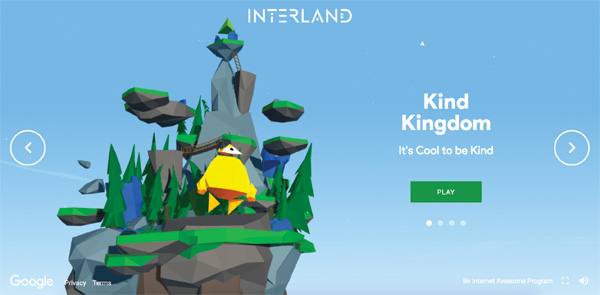Fostering Good Citizens, Online and Off
 More than 85 percent of K–12 students have home Internet access, according to recent data from the National Center for Education Statistics. But there’s no guarantee that students have the knowledge, experience, and judgment to be good citizens online. With incidents of cyberbullying continuing to make the news and increased concern about digital privacy, libraries are incorporating digital citizenship programs to give students the tools they need to make good choices as they navigate online spaces.
More than 85 percent of K–12 students have home Internet access, according to recent data from the National Center for Education Statistics. But there’s no guarantee that students have the knowledge, experience, and judgment to be good citizens online. With incidents of cyberbullying continuing to make the news and increased concern about digital privacy, libraries are incorporating digital citizenship programs to give students the tools they need to make good choices as they navigate online spaces.
Given the many ways that students use the Internet, it isn’t surprising that digital citizenship can encompass a broad array of topics. Regardless of the specifics of such programs, most curricula cover privacy, online bullying, and how to maintain a good online reputation.
At Oregon’s Multnomah County Library (MCL), librarians Cathy Camper, Jackie Partch, and Kate Houston, part of MCL’s School Corps program to support students’ academic and reading skills, have developed a program called “Take Control of Your Digital Footprint” for students in grades 6 through 12. The program covers a wide range of topics, including the importance of encryption; how to devise secure passwords; online privacy best practices; cyberbullying; and understanding the relationship between an individual’s rights and license agreements. The librarians work diligently to update their materials so they reflect changes in the law and provide new examples and cases that illustrate the topics they cover. Each workshop begins with some questions to get students thinking, and workshops can be customized based on the students’ interests and the amount of time available.
Houston notes that they like to “highlight specific things and then go deeper on what interests them,” which helps to keep students engaged. The program has already proven to be a success with a homeschooling group, and there are plans in place to expand it to the teen councils at several Multnomah branches. This type of program could be offered to adults or family groups as well, says Houston, since the topics are of interest to all ages.
If developing a new program from scratch feels overwhelming, a number of digital citizenship resources are also available. Common Sense Education’s Digital Citizenship curriculum is one option. Designed for grades K–2, 3–5, 6–8, and 9–12, the curriculum has options for all levels and includes lesson plans, videos, interactive games, assessment tools, and readings that are available as PDFs, iBooks, and through an integration with Nearpod. A curriculum can be further customized by mixing and matching content from multiple sequences.
“I don’t follow the books as they are sequenced, and I tend to combine lessons and modify a lot based on the needs and understanding of students,” says Jennifer Hanson, the director of library services at Worcester (MA) Academy, who has been using the Digital Citizenship materials for three years.
In addition to materials for educators, Common Sense Education also provides resources in both Spanish and English that are designed to get families involved and keep them connected to the training throughout the year. With its fully developed, yet flexible, modules, the Common Sense Education curriculum can be a great tool for those who are new to teaching digital citizenship. The modules enable the educator to focus on customizing the experience for students rather than designing resources from scratch. Common Sense Education also organizes an annual Digital Citizenship Week (October 18–22) and features additional events to help students and families consider online behavior.
Toward Internet awesomeness
Google is also tackling digital citizenship. In June, the company launched Be Internet Awesome curriculum, which offers a variety of resources for children, educators, parents, and guardians that promote online safety and positive decision making. The curriculum, according to the website, includes “lesson plans that have received the International Society for Technology in Education (ISTE) Seal of Alignment.” The program also offers promotional materials and activities for use in the classroom and a pledge for families to take together to be “safe and fearless explorers of the online world.” Central to Google’s approach is an online game called Interland, which tests players’ knowledge of digital citizenship topics without the need for an account or password.
In March, the community engagement manager at ISTE asked Donna Sullivan-Macdonald, a library media and instructional technology specialist at Orchard School in South Burlington, VT, to test Be Internet Awesome in advance of its release. “I found that these conversations gave students an invaluable outlet to talk about all sorts of questions and/or issues they may be having with the digital world,” says Sullivan-Macdonald, president of the Vermont School Library Association. After trying Google’s materials in the classroom, she found them so useful that she plans to combine them with elements of the Common Sense Education curriculum for her students next year, an approach she would recommend to other educators interested in offering digital citizenship training.
Regardless of the approach librarians choose, it’s clear that digital citizenship instruction is important for children and teens. These skills help students not only online, but also in every aspect of their off-line lives. “Digital citizenship is also plain and simple how to be a good citizen,” Hanson says. “Helping students see their online environment as an extension of their physical environment helps them recognize that their online behavior should not be different from how they act at school, on the athletic field, or at home.”
RELATED
The job outlook in 2030: Librarians will be in demand
The job outlook in 2030: Librarians will be in demand
ALREADY A SUBSCRIBER? LOG IN
We are currently offering this content for free. Sign up now to activate your personal profile, where you can save articles for future viewing







Add Comment :-
Be the first reader to comment.
Comment Policy:
Comment should not be empty !!!